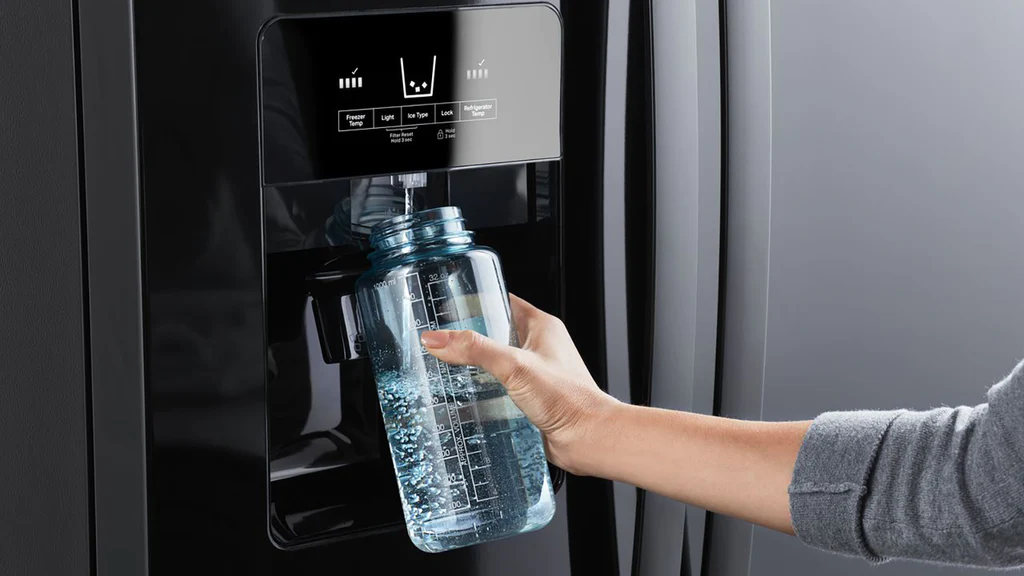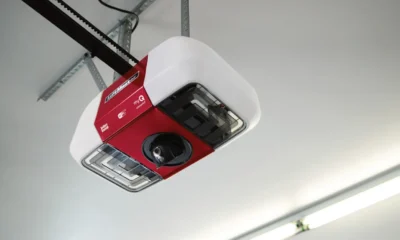Technology
Water Filters for Refrigerators: Ensuring Clean and Fresh Water at Your Fingertips

In today’s world, where health and wellness take precedence, having access to clean and pure water is essential. Water filters for refrigerators have emerged as a convenient and efficient solution to ensure that the water we consume is free from contaminants and impurities. With the ability to provide filtered water directly from your refrigerator, these filters have become a popular choice for households worldwide. In this comprehensive guide, we will explore the benefits, types, installation, maintenance, and frequently asked questions about water filters for refrigerators.
1. Why Should You Consider Water Filters for Refrigerators?
With concerns about water quality on the rise, investing in a water filter for your refrigerator can provide several advantages. Let’s explore the reasons why these filters are worth considering:
i. Pure and Clean Water for Drinking and Cooking
Water filters for refrigerators are designed to remove contaminants such as chlorine, sediment, bacteria, and other impurities. By using a filtration system, you can enjoy clean and pure water, not only for drinking but also for cooking and preparing beverages.
ii. Convenience and Accessibility
Having a water filter in your refrigerator means that you have access to filtered water at any time. Whether you need a refreshing glass of water or want to fill a pitcher for guests, the convenience and accessibility of filtered water within arm’s reach make a significant difference.
iii. Cost-Effective Alternative to Bottled Water
Investing in a water filter for your refrigerator can be a cost-effective alternative to purchasing bottled water. With a reliable filtration system, you can enjoy the same level of purity without the recurring expense and environmental impact of plastic bottles.
iv. Environmental Considerations
By using a water filter in your refrigerator, you contribute to reducing plastic waste generated by single-use water bottles. It’s a small step towards a greener and more sustainable lifestyle, where you can enjoy fresh and clean water while minimizing your ecological footprint.
2. Understanding Different Types of Water Filters for Refrigerators
When it comes to water filters for refrigerators, several types are available on the market. Understanding their differences and features will help you make an informed decision. Let’s explore the most common types:
i. Activated Carbon Filters
Activated carbon filters are among the most popular choices for refrigerator water filtration. They work by absorbing and trapping impurities, chemicals, and odors present in the water. This type of filter is effective in removing chlorine, volatile organic compounds (VOCs), and some heavy metals.
ii. Reverse Osmosis Filters
Reverse osmosis filters utilize a semi-permeable membrane to remove a wide range of impurities from the water. They are known for their ability to eliminate dissolved solids, such as fluoride, lead, arsenic, and nitrates. Reverse osmosis filters provide an extra layer of purification, ensuring exceptionally clean water.
iii. Ceramic Filters
Ceramic filters use a porous ceramic material to trap sediments, bacteria, and other contaminants present in the water. These filters are effective in removing particles larger than their pore size, ensuring that the water is free from visible impurities.
iv. UV Filters
UV filters utilize ultraviolet light to disinfect the water by killing harmful microorganisms such as bacteria and viruses. This type of filtration system is particularly effective in ensuring that the water is free from microbial contamination.
v. Inline Filters
Inline filters are installed in the water supply line of your refrigerator. They are compact and easy to install, usually requiring no additional plumbing. Inline filters are known for their ability to remove sediments, chlorine, and other impurities, providing clean and fresh-tasting water.
vi. Magnetic Filters
Magnetic filters use magnets to alter the molecular structure of contaminants present in the water. By doing so, they claim to reduce the effects of harmful substances without removing them entirely. However, the effectiveness of magnetic filters in providing purified water is still a subject of debate among experts.
3. Installation Process: How to Set Up Your Water Filter in a Refrigerator
Installing a water filter in your refrigerator is a straightforward process that can be done by following a few simple steps. Here’s a general guide to help you set up your water filter:
i. Check Compatibility and Purchase the Correct Filter
Before starting the installation process, make sure to check the compatibility of the filter with your refrigerator model. Refer to the manufacturer’s instructions or consult the appliance’s manual to ensure you purchase the correct filter for your specific refrigerator model.
ii. Locate the Filter Housing
Next, locate the filter housing in your refrigerator. It is usually located either in the interior, near the top or bottom of the refrigerator compartment, or in the grille at the base of the refrigerator. Consult the refrigerator’s manual if you’re having trouble finding the filter housing.
iii. Prepare the Filter for Installation
Remove the new filter from its packaging and remove any protective caps or seals. Some filters may require soaking in water for a few minutes before installation. Refer to the instructions provided with your filter for specific preparation requirements.
iv. Insert the Filter into the Housing
Insert the filter into the housing, following the arrows or markings on the filter for proper alignment. Ensure that the filter is securely positioned and that it fits snugly into the housing.
v. Flush the Filter
Once the filter is properly inserted, it’s essential to flush it before using the water. This helps remove any carbon fines or impurities that may be present in the filter. To flush the filter, run several gallons of water through it until the water runs clear.
vi. Reset the Filter Indicator
If your refrigerator has a filter indicator light, make sure to reset it after installing the new filter. The process for resetting the indicator light varies depending on the refrigerator model. Refer to the appliance’s manual for specific instructions.
4. Maintaining Your Water Filter: Tips for Longevity and Efficiency
Proper maintenance is crucial to ensure the longevity and efficiency of your water filter. Follow these tips to maintain your refrigerator’s water filter:
i. Regular Filter Replacement
Regularly replace the water filter according to the manufacturer’s recommendations. Over time, the filter becomes less effective in removing contaminants, and delaying replacement may compromise the quality of the filtered water.
ii. Monitor Filter Life Indicator
If your refrigerator has a filter life indicator, pay attention to the notifications it provides. This indicator is designed to alert you when it’s time to replace the filter based on usage or elapsed time. Replace the filter promptly once the indicator indicates a low filter life.
iii. Clean the Exterior of the Filter Housing
Clean the exterior of the filter housing periodically to prevent the buildup of dust, dirt, or debris. Use a damp cloth or sponge to wipe the exterior surface of the housing. Avoid using harsh chemicals or abrasive cleaners, as they may damage the housing.
iv. Inspect for Leaks
Regularly inspect the filter housing and connections for any signs of leaks. If you notice any leaks or drips, tighten the connections or replace any damaged components. Addressing leaks promptly will help maintain the integrity of the filtration system and prevent water damage to your refrigerator.
v. Follow Manufacturer’s Instructions
Always refer to the manufacturer’s instructions and guidelines for specific maintenance recommendations. Different filter models may have unique maintenance requirements, such as additional cleaning or troubleshooting steps. Adhering to the manufacturer’s instructions ensures optimal performance and extends the lifespan of your water filter.
5. Frequently Asked Questions About Water Filters for Refrigerators
To further enhance your understanding of water filters for refrigerators, let’s address some commonly asked questions:
Q1: How often should I replace the water filter in my refrigerator?
A1: The frequency of filter replacement depends on various factors, including the refrigerator model and filter type. In general, it is recommended to replace the filter every 6 months or according to the manufacturer’s guidelines.
Q2: Can I install a water filter in any refrigerator?
A2: Not all refrigerators are compatible with water filters. Check your refrigerator’s specifications or consult the manufacturer to determine if it can accommodate a water filter. If compatible, ensure you purchase the correct filter for your specific refrigerator model.
Q3: How do I know when it’s time to replace the water filter?
A3: Most modern refrigerators have filter life indicators that notify you when it’s time to replace the filter. These indicators may be based on elapsed time or water usage. Additionally, a decrease in water flow or a change in taste and odor may indicate that the filter needs replacement.
Q4: Can I use a generic or off-brand water filter for my refrigerator?
A4: While generic or off-brand filters may fit your refrigerator, it’s recommended to use filters specifically designed for your refrigerator model. Genuine manufacturer filters ensure compatibility and optimal filtration performance, providing you with the best water quality.
Q5: How do I dispose of the used water filter?
A5: Used water filters should be properly disposed of according to local regulations. Check with your local waste management authorities for guidance on the correct disposal methods for used filters. Some filters can be recycled, so it’s worth exploring recycling options in your area.
Q6: Can I use the refrigerator’s water filter for ice-making?
A6: Yes, the water filter in your refrigerator is designed to provide filtered water for drinking and ice-making purposes. It ensures that both the water you consume and the ice cubes you use are free from impurities and contaminants.
Conclusion
Investing in a water filter for your refrigerator is a practical and effective way to ensure access to clean and fresh water for you and your family. With various types of filters available, you can choose one that suits your needs and preferences. By following the installation and maintenance guidelines, you can enjoy the benefits of purified water while contributing to a greener and healthier lifestyle.
Remember to replace your water filter regularly, monitor the filter indicator, and adhere to the manufacturer’s instructions for optimal performance. With a water filter for your refrigerator, you can enjoy the convenience, accessibility, and peace of mind of having clean and refreshing water at your fingertips.
Related posts:

Categories
- Apps (1)
- Automotive (23)
- Beauty (7)
- Business (117)
- Celebrities (2)
- Digital Marketing (21)
- Ecommerce (1)
- Education (18)
- Entertainment (25)
- Events (6)
- Features (4)
- Fitness (10)
- Food (1)
- Forex & Crypto (15)
- General (105)
- Health (48)
- House (61)
- Lifestyle (48)
- Marketing (8)
- Parenting (3)
- Pets (10)
- Real Estate (7)
- Safety and Security (11)
- Social Media (20)
- Sports (96)
- Technology (67)
- Travel (22)



















